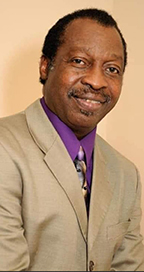Tyrone Alexander Ash, age 71, was born February 16, 1951 into the family of the late Solomon Ash and Lillian Ash in Nassau, Bahamas. He was preceded in death by Rudolph Ash (brother) and Helena Ash (sister). He was the fifth of eleven children and the last to be born in the Bahamas. From humble beginnings, he was raised in Hollywood (Liberia), Florida and excelled academically, athletically, spiritually, and socially.
Tyrone was a trailblazer. He began the tenth grade at Dania Sterling High School which later became known as Hollywood Hills High School. This was the first fully integrated high school in Broward County. The school was composed of fifty African American students and three hundred fifty non-African American students. All of the students were tenth graders, from five different high schools. There he became the first President in the new school’s history and the first African American President of a student council at an integrated high school in Broward County.
He attended Tennessee Tech University for one year; however, he thrived while matriculating at Southern Illinois University in Carbondale. There his thirst for knowledge, Black consciousness, and political activism was met by an African American population of more than three thousand. He secured a work study job on campus with the Black American Studies Department, where he absorbed countless lessons and teachings by the famous and infamous historians that taught at the University. He adopted the African name “Oyn Oye,” meaning “Primitive Fire.” He joined the local chapter of the Black Panther Party and was an integral part of their breakfast program and after-school tutoring programs. Upon graduation, he returned to South Florida to become a change agent in his own community and armed with a degree in Government, a focus on Systems Development, and a minor in Black Studies.
Tyrone took the African proverb, “Each one teach one” to heart. He believed that armed with knowledge of African culture, the youth would be empowered to enact positive change in their communities. He petitioned the School Board of Broward County and was approved to develop and teach the first African culture and history class in the County, naming it Ethnic Studies, satisfying a condition from the petition. These classes were held at B.F. James Adult Center. For the next three decades, Tyrone pursued opportunities to advance the fight for racial equality and justice. Tirelessly and enthusiastically, he motivated young and old to engage in pursuits for growth and the advancement of our people.
One of the greatest gifts of his legacy is his book, “The Story GrandPa Told of American and World African Legends and Culture” which was completed and self published in 2011. The book is written to be utilized as a reference tool, a conversation starter, and a means to pass on the story of our precious ancestors as they traveled the African Diaspora through to present day American History. His desire was for every household to own at least one copy.
Tyrone Alexander Ash was a faithful husband, a devoted father, loving GP (grandpa), and steadfast servant. He knew no stranger. His memories and fervent spirit will live on through his wife and best friend of forty-six years Dr. Yvonne McClelland Ash, his daughters TaVonne Lailait Johnson and Yvette Monique Ash, and his son Alexander Xavier Ash; seven grandchildren: Tionna Johnson, Robert Johnson IV, Brianna Duplan, Jordyn Ash, London Ractor, Ryleigh Duplan, and L’Oreal Ash; eight siblings: Anthony Ash, Phillip Ash, Michael Ash, Christine Shipman, Timothy Ash, Angela Ash, Theodore Ash, and Douglas Ash; four sister-in-laws: Ann Ash, Carmen Ash, Debra Ash, and Nicole Ash; one brother-in-law Frank Shipman and many nieces, nephews, and cousins.
Our lives were enriched because he was in it. His presence, his warmth, his love, his time which he gave so freely will always be remembered and forever appreciated. And now, a final message…
Ancestors Lessons
“Finally, brethren, whatsoever things are true, whatsoever things are honest, whatsoever things are just, whatsoever things are pure, whatsoever things are lovely, whatsoever things are of good report; if there be any virtue, and if there be any praise, think on these things” (Philippians 4:8)

